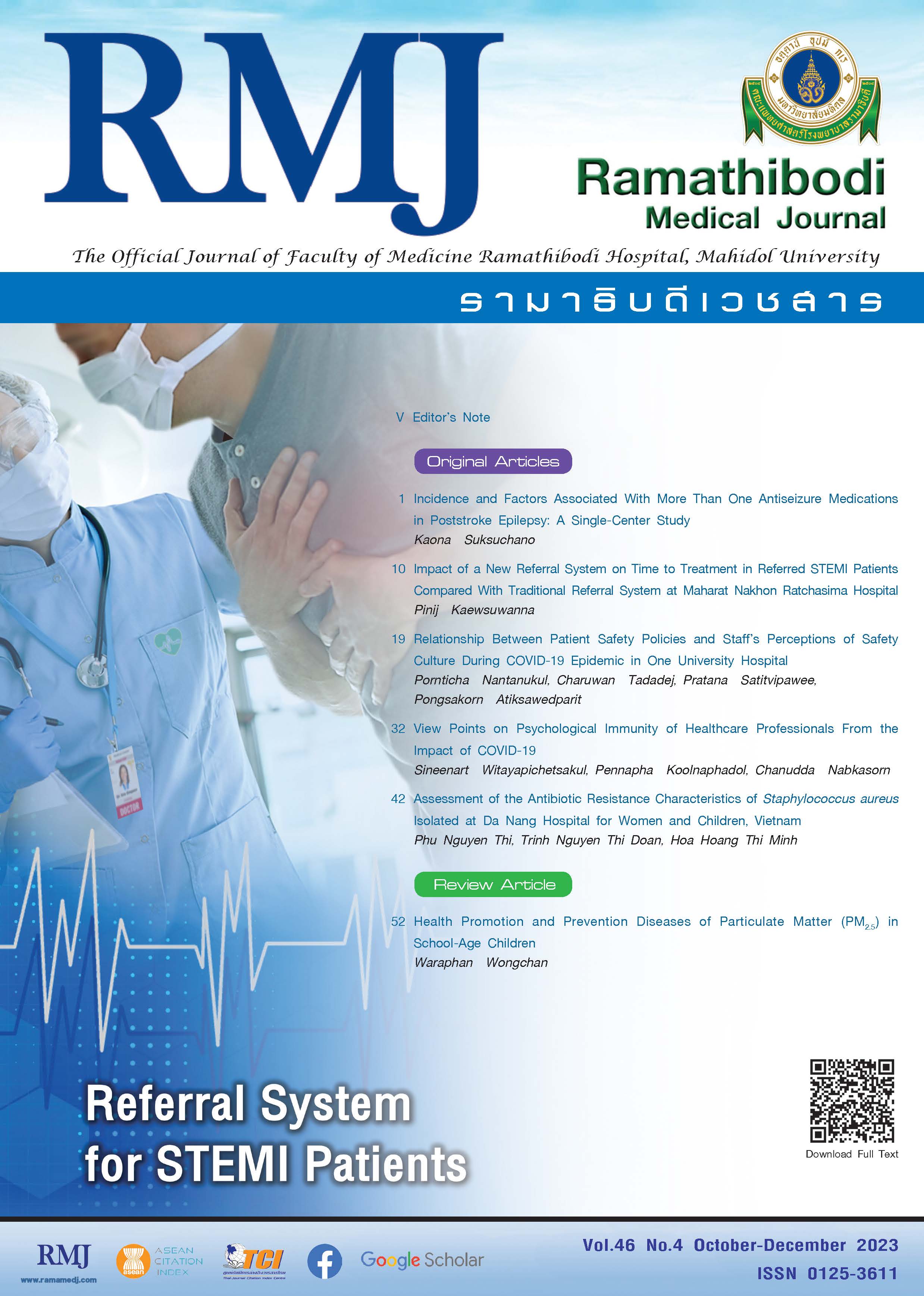View Points on Psychological Immunity of Healthcare Professionals From the Impact of COVID-19
DOI:
https://doi.org/10.33165/rmj.2023.46.4.264414Keywords:
Reflexive thematic analysis, Self-control, Optimism, Resilience, Self-efficacyAbstract
Background: The world is rapid changes that affect many dimensions results in their adaptation and cause anxiety and mental health problems.
Objective: To find the definition, components, and guidelines to enhance psychological immunity among healthcare professionals.
Methods: A qualitative research was undertaken among 16 participants, aged over 30 years, who have worked in Thailand including medical physicians, dentists, pharmacist, registered nurses, and public health officers. Participants were recruited by snowball or chain sampling. Data were collected by in-depth interviewing with a semistructured questionnaire, then analyzed by a reflexive thematic analysis.
Results: The informants specified the definition of psychological immunity as people can protect their minds from severe to mild. Components of psychological were as people must be able to control themselves, including their thought, emotions, and expressions and no react quickly; people need to practice often to reduce the impact by optimism; people can be face and overcome them; and people need to know own abilities, feelings, thoughts and goals. Way to had psychological immunity were opening their mind to understand and learn.
Conclusions: The results of the interviews were consistent and different in some issue with prior domestic and abroad research. To give importance for thoughts in addition to a person’s emotions and behavior, adjust perspective, and be hopeful.
References
Thakur V, Jain A. COVID 2019-suicides: a global psychological pandemic. Brain Behav Immun. 2020;88:952-953. doi:10.1016/j.bbi.2020.04.062
Pearman A, Hughes ML, Smith EL, Neupert SD. Mental health challenges of United States healthcare professionals during COVID-19. Front Psychol. 2020;11:2065. doi:10.3389/fpsyg.2020.02065
Bohlken J, Schömig F, Lemke MR, Pumberger M, Riedel-Heller SG. COVID-19 pandemic: stress experience of healthcare workers - a short current review. Psychiatr Prax. 2020;47(4):190-197. doi:10.1055/a-1159-5551
Vagni M, Maiorano T, Giostra V, Pajardi D. Coping with COVID-19: emergency stress, secondary trauma and self-efficacy in healthcare and emergency workers in Italy. Front Psychol. 2020;11:566912. doi:10.3389/fpsyg.2020.566912
Gao J, Zheng P, Jia Y, et al. Mental health problems and social media exposure during COVID-19 outbreak. PLoS One. 2020;15(4):e0231924. doi:10.1371/journal.pone.0231924
Deng HB, Tam T, Zee BC, et al. Short sleep duration increases metabolic impact in healthy adults: a population-based cohort study. Sleep. 2017;40(10):zsx130. doi:10.1093/sleep/zsx130
Jung SJ, Jun JY. Mental health and psychological intervention amid COVID-19 outbreak: perspectives from South Korea. Yonsei Med J. 2020;61(4):271-272. doi:10.3349/ymj.2020.61.4.271
Suryavanshi N, Kadam A, Dhumal G, et al. Mental health and quality of life among healthcare professionals during the COVID-19 pandemic in India. Brain Behav. 2020;10(11):e01837. doi:10.1002/brb3.1837
Netirojjanakul W. Prevalence and associated factors of mental health problems on healthcare workers at Nakhonpathom Hospital in coronavirus disease 2019 (COVID-19) epidemic era. Region 4-5 Med J. 2020;39(4):616-627.
Aimnang C, Tribuddharat S, Sathitkarnmanee T, Sabangban L. Stress of anesthesia personnel at Srinagarind hospital during COVID-19 pandemic. Srinagarind Med J. 2021;36(3):347-352.
Lima de Moura Cal SF, Glustak ME, Mittermayer Barreto S. Psychological Resilience and Immunity. In: Khan WA, ed. Innovation Immunology. Austin Publishing Group; 2015:1-20.
Oláh A, Kapitány-Föveny M. Ten years of positive psychology. Magyar Pszichológiai Szemle. 2012;67(1):19-45. doi:10.1556/MPSzle.67.2012.1.3
Albert-Lőrincz E, Albert-Lőrincz M, Kádár A, Krizbai T, Lukács-Márton R. Relationship between the characteristics of the psychological immune system and the emotional tone of personality in adolescents. New Educ Rev. 2011;23(1):103-113.
Zidan E. The psychological immunity, its’ definitions, dimensions. Journal of Faculty of Education, Tanta University. 2013;8(51):811-822.
Choochom O. The development of a self-immunity scale. Journal of Psychology Kasem Bundit University. 2013;3(1):8-19.
Charupheng M. A study and development of psychological immunity of Thai adolescents. Journal of Education Research Faculty of Education, Srinakharinwirot University. 2017;12(1):173-192.
Pusitrattanavale S, Phimpraphan A, Imduang D. Development of youths’ immunity drug prevention in Nakhon Si Thammarat province through transformative learning. Journal of Southern Technology. 2020;13(2):43-53.
Usher R. Critique of the neglected epistemological assumptions of educational research. In: Scott D, Usher R, eds. Understanding Educational Research. Rutledge; 1996:24.
Sutheewasinnon P, Pasunon P. Sampling strategies for qualitative research. Parichart Journal. 2016;29(2):31-48.
Cheawjindakarn B. Qualitative case study research techniques. Liberal Arts Review. 2018;13(25):103-118. doi:10.14456/lar.2023.1
Chantavanich S. Qualitative Research. 23rd ed. Chulalongkorn University Press; 2016.
Braun V, Clarke V. Reflecting on reflexive thematic analysis. Qual Res Sport Exerc Health. 2019;11(4):589-597. doi:10.1080/2159676X.2019.1628806
Shapan NL, Ahmed AF. The rationing of psychological immunity scale on a sample of visually impaired adolescents: rationing of psychological immunity scale on a sample of visually impaired adolescents. Int J Innov Educ Res. 2020;8(3):345-356. doi:10.31686/ijier.vol8.iss3.2236
Seligman MEP. Learned Optimism: How to Change Your Mind and Your Life. Knopf Doubleday Publishing Group; 2011.
Luthans F. The need for and meaning of positive organizational behavior. J Organ Behav. 2002;23(6):695-706. doi:10.1002/job.165
Bandura A. Self-Efficacy. In: Ramachaudran VS, ed. Encyclopedia of Human Behavior. Academic Press; 1994;4:71-72.
Downloads
Published
How to Cite
Issue
Section
License
Copyright (c) 2023 Ramathibodi Medical Journal

This work is licensed under a Creative Commons Attribution-NonCommercial-NoDerivatives 4.0 International License.

















